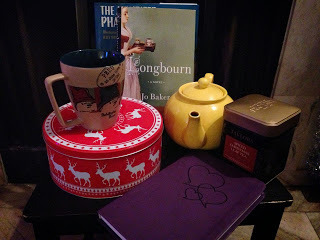Marcia Thornton Jones's Blog, page 206
January 13, 2014
A Controversial New Beginning (January theme)
by Tracy Barrett
I’m a bit hesitant to post this because people are passionate about the topic and I’m afraid I’ll have to duck. No, the topic isn’t politics. It’s not religion or the Second Amendment or the right of this person to marry that one.
It’s about getting rid of books. And I know that the mere concept of “getting rid of” something as holy as a book will cause many to shudder.
I’m facing a huge new beginning this year. We’re planning to move from the house where we’ve lived for more than twenty years to one in a quieter neighborhood, now that we no longer need to be near my day job or in the zone of the elementary school we wanted our kids to go to. In preparation we’ve been going through decades of stuff, filling our trash cans to overflowing each week and making multiple trips to Goodwill.
Fortunately, we don’t have a lot of storage space, so we haven’t been able to hoard as much as one of us would like, but something we have in abundance is books.
For me, a book on a shelf is a corpse. If it hasn’t been read for decades and probably will never be read again, it might as well no longer exist. I write my books so that they will be read, and I want to honor the authors I love by keeping their writing alive. Rather than putting those books in a box and moving them and putting them on new shelves, never to be opened again, I’m taking them to the library to be sold to someone who will resuscitate them by reading them. (The fact that the sale will benefit the library is another plus.)
Only a few dozen books have gone. Our shelves still hold many that I’ll reread, as well as the ones I use for research and the ones I’ve had autographed at conferences. I’ve also kept a few with specific sentimental value: they remind me of myself at an earlier age or the person who wrote them or the person who gave them to me. “I’ve had it forever” isn’t enough; to me, that equates to keeping a book on life support.
Anne Fadiman divides book-lovers into two camps in her essay “Never Do That to a Book” (in Ex Libris): Platonic lovers, for whom “a book’s physical self was sacrosanct . . . , its form inseparable from its content” and carnal lovers, in which group she includes her family, for whom “a book’s words were holy, but the paper, cloth, cardboard, glue, thread, and ink that contained them were but a mere vessel, and it was no sacrilege to treat them as wantonly as pragmatism and desire dictated. Hard use was a sign not of disrespect but of intimacy.” Count me in, Fadimans.
So along with expired medications, shabby clothes, kitchen implements I never use, and towels I never liked, corpses of unread books are leaving our house. When we begin life in our new home we’ll have around us only living things, including beloved books.
Published on January 13, 2014 04:00
January 11, 2014
Writer Beginnings
How did we get our start as writers? When did we realize we wanted to write? It's a question many of us are asked at conferences, workshops and events. I'm sure the answers are as unique as the writers themselves. As for me, it is hard to remember a time when I didn't write. As a child, I spent many a rainy day practicing cursive letters, writing notes and letters to friends and loved ones. What I wouldn't give to have a few of those early attempts at creativity. Thankfully, I do have some papers my dear mom saw fit to tuck away in a box of "stuff" many years ago. I will share one with you in honor of beginnings.
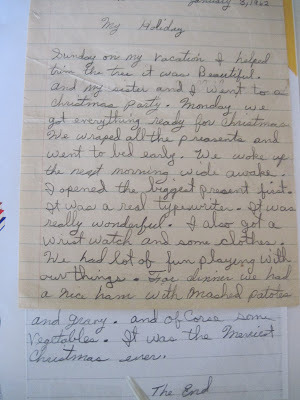
Despite spelling errors and letters tilting in all directions, the enthusiasm for self-expression is evident in this early essay. The fact that my mom kept it, meant she saw the value of that attempt as well. Never doubt the power of the written word. Even as we struggle, we can move mountains.
By the way, that Smith Carona typewriter got me through high school and college term papers. It sits, tucked away in a closet. A symbol of a writer's beginnings.

Despite spelling errors and letters tilting in all directions, the enthusiasm for self-expression is evident in this early essay. The fact that my mom kept it, meant she saw the value of that attempt as well. Never doubt the power of the written word. Even as we struggle, we can move mountains.
By the way, that Smith Carona typewriter got me through high school and college term papers. It sits, tucked away in a closet. A symbol of a writer's beginnings.
Published on January 11, 2014 22:00
On Beginnings, First Lines, and Why I No Longer Set Annual Goals from Jody Feldman

In the beginning ...
Once upon a time ...
It all started when ...
Each phrase holds a bit of excitement. A rush. A promise.
I have probably written hundreds of first lines. Maybe even thousands if you count the ones I’ve never put down in black and white. At least 77.4% were excellent, some better than any first lines I’ve ended up using. The thing is, some of these killer starts couldn’t deliver what they’d promised.
I thought they could. But any writer will tell you that stories and characters develop minds of their own. They’ll run away from you. Hide. Take twists and turns. Grow in some places. Shrink in others.
Sort of like life.
There were many years when I started each January with my own first lines in the form of annual writing goals. Halfway through the year, more often than not, I was nowhere on the right track. It didn’t matter that I had gone astray because my characters weren’t developed enough or that certain scenes weren’t as strong as possible. It didn’t dawn on me that I could and should take a breath, attend to learning my craft better, then allow output to follow.
After all, I was going to workshops. I was reading how-to articles. But with those self-imposed deadlines staring me in the face, I rushed through the learning process. And those goals I set for myself? Maybe I was meeting them, but not with the implied promise of quality work.
And so I chucked those first-of-the-year lines in favor of one over-riding goal:
To work on story and craft continually.
Even with such a simple goal, I probably expect more of myself. I know I have accomplished more. I have woven that goal throughout my writing life so that it doesn’t only provide a start, a rush, a promise, but it also delivers on a satisfying finish. Every time.

Published on January 11, 2014 04:00
January 9, 2014
January Theme: Beginnings…and Those Pesky ResolutionsBy M...
January Theme: Beginnings…and Those Pesky ResolutionsBy Marcia Thornton JonesHappy New Year!
Our January theme of beginnings made me think of one of my favorite plotting exercises: writing bookends to a story. It’s a simple exercise that uses the opening of a work-in-progress to provide a-ha’s into character transformation and story resolution.
· First write a brief opening scene.· Then copy/paste the opening scene and rewrite it as a mirrored ending that shows how the character has evolved as a result of his/her journey (use the same setting, descriptions, dialogue, and character traits but tweak them to convey transformation).· Based on the bookends, write a plot synopsis by summarizing what needs to happen to move the character from the story beginning to the rewritten resolution.Resolution.Such a loaded word. In writing it’s the end of the character’s story, but at this time of year it hints of goals and intentions; about beginning a personal journey. I’ve never been successful with resolutions so I'm going to modify the above exercise in order to provide a few personal a-ha’s for my own story. Anyone else out there willing to accept the challenge to write a bookend summary for 2014?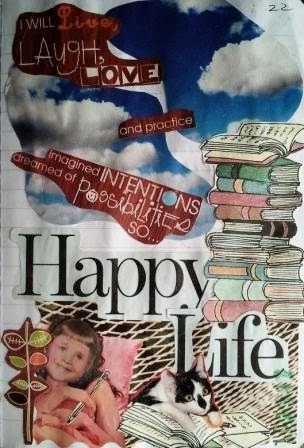 Here’s how:· First write a brief beginning describing you as you are right now.· Then rewrite the beginning showing a transformed you on December 31, 2014.· Finally, write a summary showing what needs to happen between those two bookends in order to make that transformation a reality.
Here’s how:· First write a brief beginning describing you as you are right now.· Then rewrite the beginning showing a transformed you on December 31, 2014.· Finally, write a summary showing what needs to happen between those two bookends in order to make that transformation a reality.
Now all that’s left is to live your plot!
Happy beginnings, resolutions…and all plot events in the middle!
Our January theme of beginnings made me think of one of my favorite plotting exercises: writing bookends to a story. It’s a simple exercise that uses the opening of a work-in-progress to provide a-ha’s into character transformation and story resolution.
· First write a brief opening scene.· Then copy/paste the opening scene and rewrite it as a mirrored ending that shows how the character has evolved as a result of his/her journey (use the same setting, descriptions, dialogue, and character traits but tweak them to convey transformation).· Based on the bookends, write a plot synopsis by summarizing what needs to happen to move the character from the story beginning to the rewritten resolution.Resolution.Such a loaded word. In writing it’s the end of the character’s story, but at this time of year it hints of goals and intentions; about beginning a personal journey. I’ve never been successful with resolutions so I'm going to modify the above exercise in order to provide a few personal a-ha’s for my own story. Anyone else out there willing to accept the challenge to write a bookend summary for 2014?
 Here’s how:· First write a brief beginning describing you as you are right now.· Then rewrite the beginning showing a transformed you on December 31, 2014.· Finally, write a summary showing what needs to happen between those two bookends in order to make that transformation a reality.
Here’s how:· First write a brief beginning describing you as you are right now.· Then rewrite the beginning showing a transformed you on December 31, 2014.· Finally, write a summary showing what needs to happen between those two bookends in order to make that transformation a reality.Now all that’s left is to live your plot!
Happy beginnings, resolutions…and all plot events in the middle!
Published on January 09, 2014 19:44
January 7, 2014
Making Room (January Theme)
by Naomi Kinsman
I spent all day on Sunday emptying each drawer and cabinet in the kitchen, cleaning, recycling what I could, donating what wasn't needed, and putting only the essentials back.
Across the room, my husband was watching football, wondering what in the heck I was doing. Which got me to wondering: What was I doing? Somehow, I'd spontaneously decided that organizing the kitchen was the top item on my to-do list, more important even than kicking up my feet and taking a break. Our kitchen wasn't a disaster or anything. Why the urgency?
About halfway through, I noticed my mind settling. I hadn't even realized it was out of sorts. I have a million things on my plate, old projects, in-process projects, and with the start of the new year, a number of new projects. Thoughts and ideas and inspiration were all rattling around in my brain needing to be sorted, decided on, and reordered. I was physically doing in my kitchen what I had no ability to do in my own head.
On Monday morning, I woke up refreshed, ready to tackle my life again. As adults, we don't have the hard start beginnings that we had as kids. Even the start of the school year or start of the calendar year doesn't bring the kind of brand new start that they used to. We aren't in a new class with a new teacher and a new set of assignments, having finished everything before we left on summer break. We have to find the way to open the doorway to new beginnings that happen in rolling waves, and usually without having completely finished all that came before. No wonder we have a million thoughts rattling around in our brains.
What we need is something tangible that we can do to establish order. Cleaning the kitchen, or the closet or our desk is not just procrastination. In a way, we're cajoling our subconscious, encouraging our minds to take note and follow suit. Clear the clutter, in whatever way you can, and make room for some new beginnings! Take it from me, it's such a relief and a huge breath of fresh air.
I spent all day on Sunday emptying each drawer and cabinet in the kitchen, cleaning, recycling what I could, donating what wasn't needed, and putting only the essentials back.
Across the room, my husband was watching football, wondering what in the heck I was doing. Which got me to wondering: What was I doing? Somehow, I'd spontaneously decided that organizing the kitchen was the top item on my to-do list, more important even than kicking up my feet and taking a break. Our kitchen wasn't a disaster or anything. Why the urgency?
About halfway through, I noticed my mind settling. I hadn't even realized it was out of sorts. I have a million things on my plate, old projects, in-process projects, and with the start of the new year, a number of new projects. Thoughts and ideas and inspiration were all rattling around in my brain needing to be sorted, decided on, and reordered. I was physically doing in my kitchen what I had no ability to do in my own head.
On Monday morning, I woke up refreshed, ready to tackle my life again. As adults, we don't have the hard start beginnings that we had as kids. Even the start of the school year or start of the calendar year doesn't bring the kind of brand new start that they used to. We aren't in a new class with a new teacher and a new set of assignments, having finished everything before we left on summer break. We have to find the way to open the doorway to new beginnings that happen in rolling waves, and usually without having completely finished all that came before. No wonder we have a million thoughts rattling around in our brains.
What we need is something tangible that we can do to establish order. Cleaning the kitchen, or the closet or our desk is not just procrastination. In a way, we're cajoling our subconscious, encouraging our minds to take note and follow suit. Clear the clutter, in whatever way you can, and make room for some new beginnings! Take it from me, it's such a relief and a huge breath of fresh air.
Published on January 07, 2014 10:28
January 6, 2014
Crafting New Beginnings (Megan Frazer Blakemore)
In college one of my writing instructors used to talk about “backing into a story”. Another way to think of it is the writing before the writing. Sometimes it just takes a while to find the voice and the proper place to begin a novel.
In The Water Castle, Ephraim and his family leave Boston for Maine so that his father can recuperate from a stroke. In early drafts, I began with this stroke:
I started in the hospital as Ephraim and his siblings waited to hear the news of their father’s diagnosis. From there, they take the train home, pack, and get ready to drive up to Maine.
While these scenes served their purposes in terms of introducing the readers to the characters and setting up the scenario, they were also weighed down by needless detail. Time was spent describing a home that we would never see again in the book. And packing? What was I thinking? Perhaps the one thing less enjoyable than packing is reading about it.
I knew I needed to get the children to the actual setting of the story faster, and to set things in motion, I was reluctant to make the necessary changes. Primarily my resistance was because I loved those first lines to describe the stroke. And while of course I was familiar with the advice to “kill your darlings” (often incorrectly attributed to William Faulkner), it takes a lot for me to commit murder. Eventually I convinced myself that I needed to start in the car as the family drives north.
My goal with this new opening was to establish the two essential facts that start the story: the family is leaving home, and there is something wrong with the father. As the chapter progresses, more details are filled in. This allows for the same character development, all be it in a compacted way. With short flashbacks I could tell the story of the stroke -- and even use that beloved line -- without giving every single detail. Within the first chapter, they arrive at the Water Castle itself, and we can begin exploring their strange new home -- the setting that actually matters.
Another bit of advice I got in college was that you have to write the piece before you can write the beginning. This professor was talking about analytical essays, but the same is true of fiction. When working on a novel, write the story as it comes to you, the find -- or, more likely, craft -- the place where your book actually begins.
In The Water Castle, Ephraim and his family leave Boston for Maine so that his father can recuperate from a stroke. In early drafts, I began with this stroke:
Breakdown. Like a car on the side of the road. But it wasn't a car; it was their father. Some sort of misfiring connection in his brain. Brynn, Ephraim, and Price sat in the waiting room of the hospital while their mother was in their father's room talking with the doctors.
I started in the hospital as Ephraim and his siblings waited to hear the news of their father’s diagnosis. From there, they take the train home, pack, and get ready to drive up to Maine.
While these scenes served their purposes in terms of introducing the readers to the characters and setting up the scenario, they were also weighed down by needless detail. Time was spent describing a home that we would never see again in the book. And packing? What was I thinking? Perhaps the one thing less enjoyable than packing is reading about it.
I knew I needed to get the children to the actual setting of the story faster, and to set things in motion, I was reluctant to make the necessary changes. Primarily my resistance was because I loved those first lines to describe the stroke. And while of course I was familiar with the advice to “kill your darlings” (often incorrectly attributed to William Faulkner), it takes a lot for me to commit murder. Eventually I convinced myself that I needed to start in the car as the family drives north.
Their mother had tried to make the trip seem fun, like a vacation. “We’re going to Maine, dear!” she’d cooed to their father. His lack of response reminded Ephraim, Price, and Brynn that this trip had nothing to do with fun.
My goal with this new opening was to establish the two essential facts that start the story: the family is leaving home, and there is something wrong with the father. As the chapter progresses, more details are filled in. This allows for the same character development, all be it in a compacted way. With short flashbacks I could tell the story of the stroke -- and even use that beloved line -- without giving every single detail. Within the first chapter, they arrive at the Water Castle itself, and we can begin exploring their strange new home -- the setting that actually matters.
Another bit of advice I got in college was that you have to write the piece before you can write the beginning. This professor was talking about analytical essays, but the same is true of fiction. When working on a novel, write the story as it comes to you, the find -- or, more likely, craft -- the place where your book actually begins.
Published on January 06, 2014 11:42
January 5, 2014
January Theme: Beginning is only the Beginning by Deborah Lytton
January 1st always invigorates my writing. A new year, a fresh start--anything is possible. I vow to challenge myself to write better, with more meaning, depth and power. But beginning a manuscript is the easiest part, isn't it? How many good ideas I have that can't seem to progress past page 20? 15? 10? And that is where the devotion to our craft comes in--in the pages between the first and the last. For it is the commitment and discipline to completing the story that makes us writers.
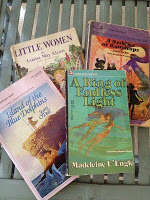 Books that inspired me to become a writerThe beginning of my journey as a children's author came with the realization that I wanted to write books like the ones I loved as a girl. The books I read when I was growing up became a part of me and the characters inspired me to be a better person. I wanted to write books that made a difference to one girl, like those books made a difference to me. The first middle grade manuscript I wrote was a story about a girl and a horse. And the real triumph was not the beginning but the very last page. I had never written something so long. My early writing was all screenplays which run 90-120 pages with a lot of space on the page. This first novel was almost 200 pages, and I was so proud of myself for finishing it. That manuscript has never been published. And my first publication, JANE IN BLOOM, was actually my seventh complete novel. I have boxes full of writing that will never be read by anyone but me--and maybe my children. But those manuscripts gave me the courage not only to begin a story, but to end a story. They taught me about story flow and character development. But mostly, they taught me about commitment. For every ending leaves room for another story to begin. And the beginning is only the beginning.
Books that inspired me to become a writerThe beginning of my journey as a children's author came with the realization that I wanted to write books like the ones I loved as a girl. The books I read when I was growing up became a part of me and the characters inspired me to be a better person. I wanted to write books that made a difference to one girl, like those books made a difference to me. The first middle grade manuscript I wrote was a story about a girl and a horse. And the real triumph was not the beginning but the very last page. I had never written something so long. My early writing was all screenplays which run 90-120 pages with a lot of space on the page. This first novel was almost 200 pages, and I was so proud of myself for finishing it. That manuscript has never been published. And my first publication, JANE IN BLOOM, was actually my seventh complete novel. I have boxes full of writing that will never be read by anyone but me--and maybe my children. But those manuscripts gave me the courage not only to begin a story, but to end a story. They taught me about story flow and character development. But mostly, they taught me about commitment. For every ending leaves room for another story to begin. And the beginning is only the beginning.
Published on January 05, 2014 10:02
January 3, 2014
A NEVEREVENDING BEGINNING by Irene Latham
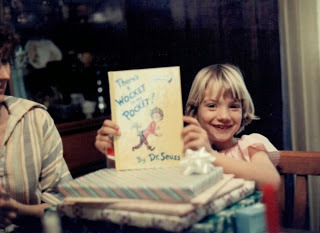 In the beginning, I wrote love poems.
In the beginning, I wrote love poems.For my mother.
I was a wee child, just learning how to pencil letters that were legible. My father often sat me on his lap and shared with me books by Dr. Seuss and Shel Silverstein. Their poems were funny and original and full of rhythm and wordplay.
My poems were serious and only occasionally original and full of attempts at rhythm and wordplay. But it didn't matter because I wasn't trying to be Dr. Seuss or Shel Silverstein.
I was learning to be ME.
I'm still learning to be me. I still feel like a beginner. I find I have to learn the same lessons over and over again: beginnings are not the place for backstory, start in medias res, hook readers with a sharp first line.
My next three books for children are poetry. The first, DEAR WANDERING WILDEBEEST: And Other Poems from the Water Hole will be released this fall. I'm not sure if this is a return to my beginnings, or proof that I am still in the midst of my own birth as a writer.
Perhaps both.
Wishing all of you brilliant beginnings in 2014!
Published on January 03, 2014 04:00
December 26, 2013
Olugbemisola Rhuday-Perkovich: After Community, Some Solitude
Published on December 26, 2013 04:46
December 25, 2013
ON BEING MY OWN COMMUNITY (HOLLY SCHINDLER)
Professional authors start out being good at writing; once their book is acquired, they realize they have to become good at publicity. This means suddenly needing to be a specialist at a myriad of completely new (and sometimes uncomfortable) tasks: Public speaking. Social networking. An author suddenly has to become charming, personable. Tech-savvy. More adept in the visual arts, as they design web pages and posters. They need to have a handle on advertising.
Publicity can feel like a daunting task, actually, whether its your first book or your twentieth that's about to release...But I've also found that no one can truly be your book's best advocate quite like its author. (It's your baby; you love it like no one else. You understand its best assets like no one else. So you can market it like no one else.) And surprisingly, marketing can also be fun. Rather than wishing for a marketing community to appear, you've got to just take the plunge, find what you're good at, what works for you...
Here's my latest fun marketing outing: a brand-new trailer for THE JUNCTION OF SUNSHINE AND LUCKY (which releases February 6)!
Happy holidays!
Publicity can feel like a daunting task, actually, whether its your first book or your twentieth that's about to release...But I've also found that no one can truly be your book's best advocate quite like its author. (It's your baby; you love it like no one else. You understand its best assets like no one else. So you can market it like no one else.) And surprisingly, marketing can also be fun. Rather than wishing for a marketing community to appear, you've got to just take the plunge, find what you're good at, what works for you...
Here's my latest fun marketing outing: a brand-new trailer for THE JUNCTION OF SUNSHINE AND LUCKY (which releases February 6)!
Happy holidays!
Published on December 25, 2013 07:05

